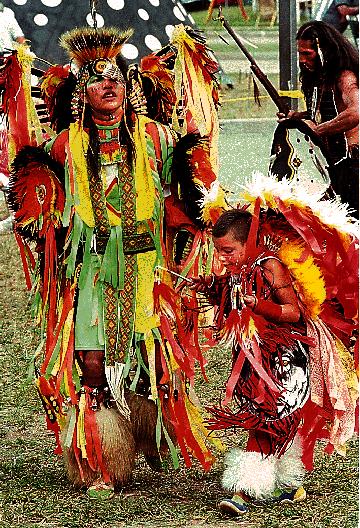 Trail Of Tears Recalled; Chief Byrd Visits Park Site
Trail Of Tears Recalled; Chief Byrd Visits Park Site
Cherokee Chief Joe Byrd, leader of the Western Band of the Cherokee, was in Tennessee over the weekend to remember the banishment that made refugees of his people.
He said when readying for the trip last week, he stopped to think as he was packing clothes and necessities for the two-week trip. "Can you only imagine when our people were in their gardens and told to leave, and didn't have time to pack anything?'
Some 16,000 Cherokees were rounded up from their farms and villages in Tennessee, Georgia and Alabama in 1838, and forced into stockades before a removal to the West. They were removed despite the winning argument before the U.S. Supreme Court by Chattanooga founder and Cherokee Chief John Ross.
Another Tennessean, President Andrew Jackson, despite the high court's ruling, mandated the removal of the Cherokee to make way for white settlers.
Chief Byrd is the principal chief of the Western Band, based in Talequah, Okla. He and his Cherokee Eastern Band counterpart, Chief Joyce Duggan, represent more than 195,000 Cherokee scattered throughout the world.
Over the weekend, Chief Byrd visited the site of the Cherokee Removal Memorial Park in Meigs County. The soon-to-be built park centers on a Cherokee star monument with the names of the Cherokee who were forced from the area on the Trail of Tears. Some 4,000 died of starvation and disease on the march.
"I want to thank you for this park,' Chief Byrd told the gathering. "Someday, I hope someone tells the real story of the Cherokee. We (Cherokees) had the first schools, the first written language and were the most educated.'
Despite their travails, Chief Byrd noted, "We are blessed. It is said the Cherokee were put on the earth for balance, and are one of the very few tribes to be scattered all over the world. Wherever I go there are always Cherokee around. The Lord has given us blessings.'
Chief Byrd and several members of his family sang hymns in Cherokee dialect, the same songs sung by the tribe the night before the Trail of Tears began.
"It's very touching and emotional to feel what our ancestors endured,' Chief Byrd said, scanning the horizon along the Tennessee River west of Decatur.
The land where the memorial is located is owned by TVA, but an agreement with the utility and the county was finalized Friday, and with the approval of the Friends of the Cherokee Removal Memorial Park organization for a nonprofit status, work can begin.
Initial designs have been completed by Alvin Cook, of Cook and Spencer Consultants of Chattanooga. Construction will include parking, building the Cherokee Star monument and construction of a genealogy library and wildlife overlook.
Archaeologist Lawrence Alexander presented a history of Hiwassee Island, which is located across a waterway from the Park.
"Chief John Jolly was born here in 1770,' said Mr. Alexander. In 1805, Col. Jonathan Meigs came to the area, and a garrison was set up to protect the Cherokee and the white settlers from radicals of both sides.
In 1809, Sam Houston lived on Hiwassee Island and later married a relative of the Chief Jolly. Called "The Beloved Man,' Chief Jolly led some Cherokee to Oklahoma prior to the Trail of Tears.
"Our whole effort here is to preserve and present the island to the public,' said Mr. Alexander. The island and memorial park are a historical package presentation.
The visitors took a boat ride to the island and a walk through the park area.
"We have suffered many tribulations,' said Chief Byrd. "But when you look at the Scriptures, many have suffered. I feel we are being prepared for greater things.'
![]()
Prepared 12:43 on 27-JUL-98